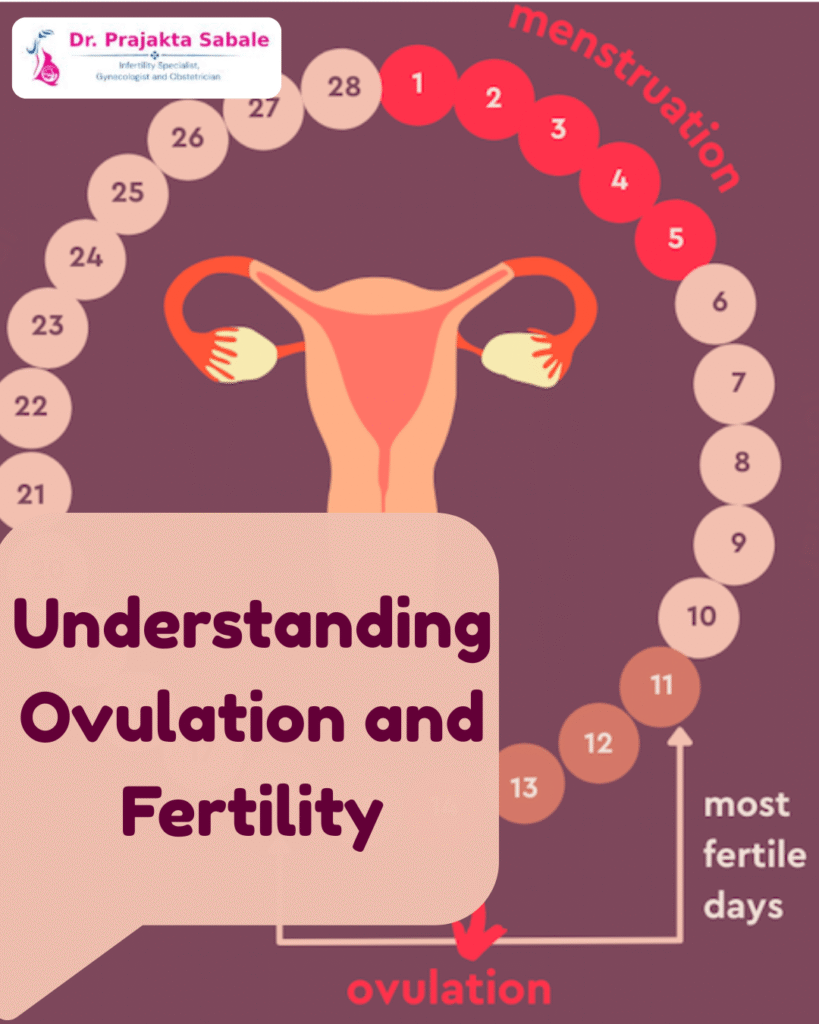If you’re trying to conceive, understanding how ovulation and fertility work can make all the difference. Knowing when you ovulate, how it affects your chances of pregnancy, and what factors can disrupt this process can help you plan effectively and seek help when needed.
Let’s explore everything you should know about ovulation, fertility, and conception, explained by Dr. Prajakta Sabale, an experienced gynecologist and fertility specialist in Hinjewadi
What Is Ovulation?
Ovulation is the process when a mature egg is released from one of the ovaries. This egg travels through the fallopian tube, where it may meet sperm for fertilization. It’s the most fertile phase of your menstrual cycle and a key factor in natural conception.
Without ovulation, pregnancy cannot occur — which is why tracking and understanding ovulation is so important for couples planning to conceive.
When Does Ovulation Happen?
For most women with a regular 28-day menstrual cycle, ovulation usually occurs around day 14 — about two weeks before the next period starts. However, ovulation timing can vary depending on cycle length, stress, hormones, or health conditions.
Women with irregular periods may ovulate earlier or later, making it harder to predict the fertile window without proper monitoring.
Ovulation and Pregnancy
Ovulation is directly linked to fertility. The fertile window — usually 5 days before and 1 day after ovulation — is when you have the highest chance of getting pregnant. Sperm can survive in the reproductive tract for up to 5 days, while the egg lives for about 24 hours after release.
That’s why timing intercourse during ovulation increases the likelihood of conception.
How Do You Know When You Are Ovulating?
You can identify ovulation by tracking physical signs or using ovulation predictor kits. Common ovulation symptoms include:
-
Clear, stretchy cervical mucus (like egg white)
-
Mild pelvic or lower abdominal pain (ovulation pain)
-
Slight rise in basal body temperature
-
Increased libido
-
Breast tenderness
-
Positive results on ovulation test kits
Monitoring these signs regularly can help you pinpoint your fertile window more accurately.
Why You Might Not Ovulate Regularly
Several factors can affect ovulation regularity, including:
-
Polycystic Ovary Syndrome (PCOS)
-
Thyroid disorders
-
Excessive stress
-
Over-exercising or poor diet
-
Hormonal imbalances
If you experience irregular periods or missed cycles, it’s essential to get evaluated. A gynecologist can help diagnose the underlying cause and provide personalized treatment to restore healthy ovulation.
How to Improve Your Chances of Ovulation
Improving lifestyle habits and maintaining hormonal balance can support regular ovulation:
-
Eat a balanced diet rich in vitamins and minerals
-
Maintain a healthy weight
-
Exercise moderately — not excessively
-
Manage stress through yoga or meditation
-
Get adequate sleep
-
Avoid smoking, alcohol, and caffeine overuse
For women with hormonal or ovulatory issues, Dr. Prajakta may recommend medication or fertility treatments to stimulate ovulation safely.
How Ovulation Affects Fertility
Healthy and consistent ovulation is essential for conception. If ovulation doesn’t occur, or the egg quality is poor, it becomes difficult for fertilization and implantation to happen.
By understanding your ovulation cycle, tracking symptoms, and consulting an experienced gynecologist like Dr. Prajakta, you can enhance your fertility and improve your chances of a successful pregnancy.
When to Consult a Doctor
You should see a doctor if you:
-
Have irregular or absent periods
-
Have been trying to conceive for over 6–12 months without success
-
Experience pain during ovulation or menstruation
-
Notice sudden changes in your menstrual cycle
Dr. Prajakta Sabale, a trusted gynecologist and fertility specialist in Hinjewadi, can assess your hormonal health, guide you on ovulation tracking, and suggest appropriate fertility treatments if needed.
Conclusion
Understanding ovulation is the first step toward improving your fertility and planning your pregnancy effectively. Regular cycles, balanced hormones, and a healthy lifestyle all play vital roles in natural conception.
If you’re facing difficulty conceiving or unsure about your ovulation pattern, consult Dr. Prajakta Sabale, IVF Specialist and fertility expert in Hinjewadi, for personalized guidance and advanced fertility solutions.
Your journey to parenthood begins with understanding your body — and with expert care, your dream of becoming a parent can come true.

